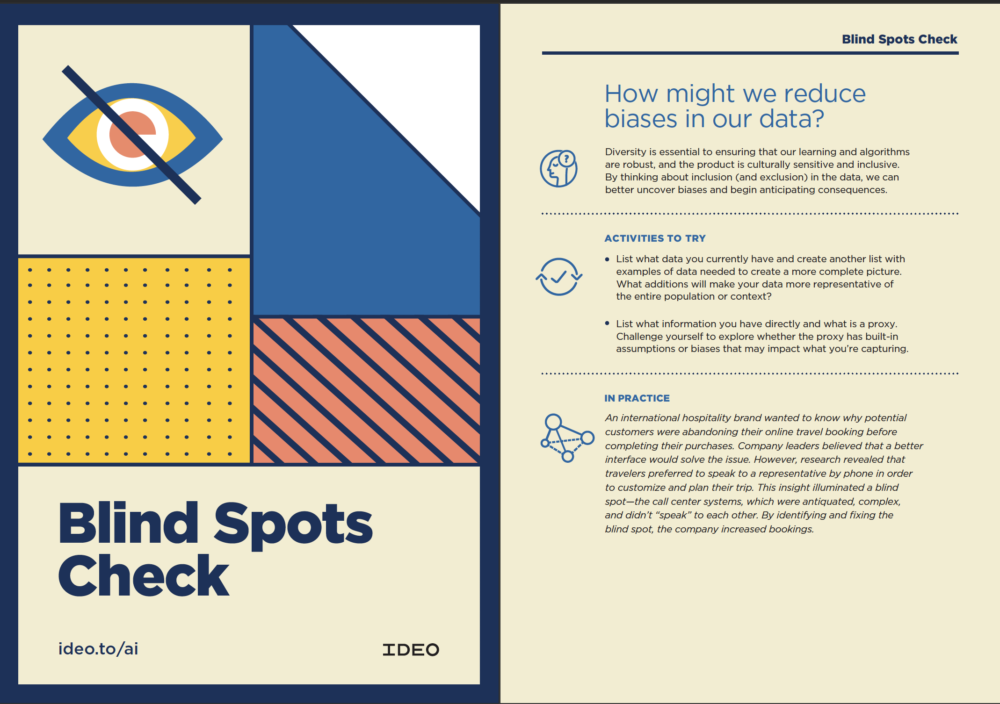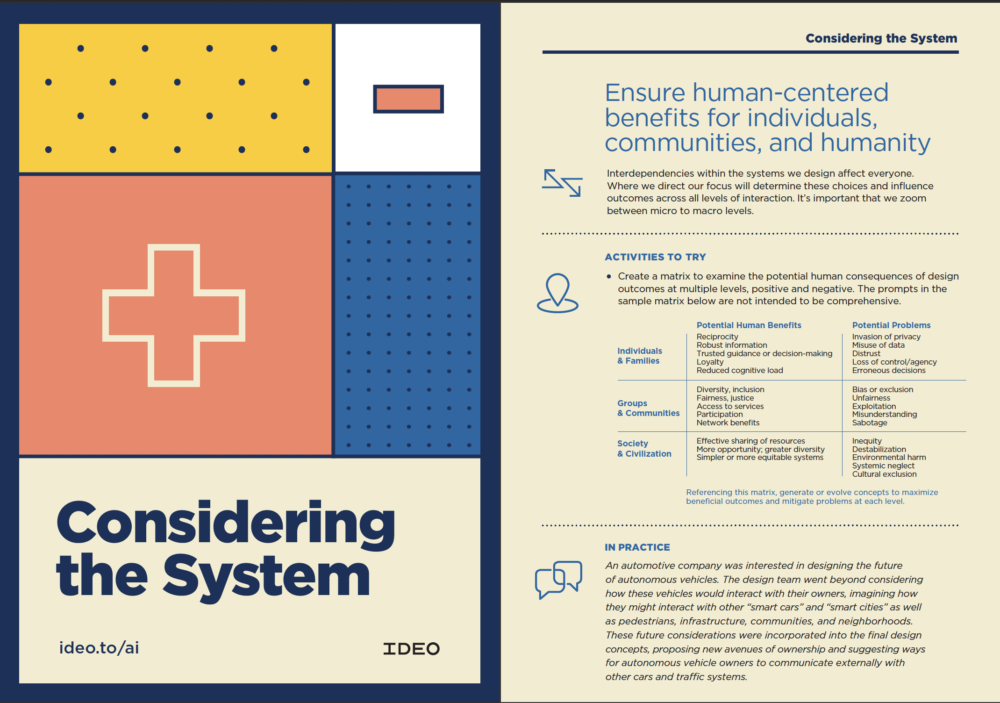Tool: AI Ethics Cards
Data systems and algorithms are deployed on a large scale and at an unprecedented speed, so unforeseen consequences can affect people on that same scale and speed. How can people always be put first in the design of data and AI systems? Especially when those systems change and evolve over time? This is what the AI Ethics Cards from IDEO (a global design company) are trying to answer.
The card set consists of four major design principles and ten activities, intended to be used in teams working on the development of data-driven products and services. They help designers to maintain a human-centred focus during the service or product development process.
- Target group: ux designers, ontwikkelaars en software developers van gebruikersproducten
- Project phase: ontwerp, ontwikkeling, evaluatie
- System component: interface en hele systeem
- Price: gratis, workshop te boeken
Purpose of the card set
Gather the multidisciplinary team that designs the service or product and use the card set to stimulate a discussion. The card set can be used for four specific purposes:
at the start of a project, to check what data you are collecting and what effect this has on the design of the service or product.
At decision and planning moments, to reflect on how solutions and decisions affect the target audience of the service or product.
when developing a prototype, to reflect on how the target audience will interact with the service or product and help the development team set up successful user tests.
throughout the development process, to encourage the team to design with a continued human-centred approach.
Contents of the card set
The card set consists of four design principles, ten activities and a pause flag.
The pause flag can be raised by anyone during the discussion when they feel that an element or characteristic of the service or product is not sufficiently human-centred. By raising the flag when you do not agree with the direction being taken, you enter into a dialogue with each other as a team to make the service or product better.
The four design principles are
data is not truth: data can be distorted by collecting, analysing, interpreting or presenting and visualising the data.
Don’t presume the desirability of AI: just because AI can do something, doesn't mean it should. What things change through the use of AI and is this desirable?
Unintended consequences of AI are opportunities for design: use unforeseen consequences as a starting point for a new iteration of the design of the service or product.
Respect privacy and the collective good: reflect on the design, the management, the use of data for new purposes, and the way you communicate with users about how their data is used.
The ten activity cards each contain a particular challenge or element that the development team needs to pay extra attention to in order to develop a human-centred product or service. On each card, in addition to the challenge, there are some concrete actions that you can take as a team to eliminate that challenge, as well as a real-life example that demonstrates why it is important to pay attention to that particular challenge. The ten activity cards are:
Blind spots check: on how to reduce prejudice.
People behind the data: about the importance of interacting with the people behind the data.
Minimal data needed: about limiting the data that is collected and analysed.
Mapping the system: about the added value of data mapping for the identification of biases, gaps, but also opportunities.
Monitoring: about the need to monitor a system and its process.
Respecting culture: about taking cultural and contextual values into account in the design of the service or product.
Designing the seams: clarifying which steps are automatic, semi-automatic or manual in the service or product.
Balance giving and getting: about finding a good balance between what your product or service gives to and takes from a user.
Anticipating future use cases: about the importance of anticipating risky situations or abuses of your product or service.
Considering the system: about balancing the individual and collective value of a data or AI system.
Instructions card set
There is no script or guide for a workshop with the card set, but use the card set as a tool to discuss with a multidisciplinary team the design of a product or service, and the importance of a human-centred technology.
Links
This tool was not developed by the Knowledge Centre Data & Society. We describe the tool on our website because it can help you deal with ethical, legal or social aspects of AI applications. The Knowledge Centre is not responsible for the quality of the tool.


